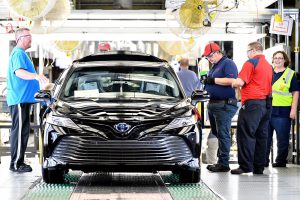
Toyota’s Bob Carter said he expected sales for parts of 2020 to be “lumpy,” during a web conference with journalists.
The U.S. automotive market has bounced back significantly stronger than expected – but could run into a “lumpy” couple months, cautioned a senior Toyota official Monday.
Demand is still off from pre-COVID forecasts, Bob Carter, the executive vice president of sales for Toyota Motor North America, or TMNA, said during a media web conference. That’s particularly true on the fleet side, though retail sales are picking up fast. The big problem is that even with North American factories back up and running, inventories are running short after a two-month industry shutdown caused by the coronavirus pandemic.
The past weekend was “the best weekend we have experienced, post-COVID,” Carter said, adding that “The market … continues to recover beyond anyone’s expectations.” But there’s a downside to the rapid rebound, warning that, “We’re entering a short-term period where … sales are going to be lumpy” due to supply shortages.
(Toyota CEO vows to stay in black despite pandemic, global recession.)
That’s in line with research released last week by LMC Automotive that estimated U.S. dealers currently have about 2.6 million vehicles in showrooms, about 1.3 million below what was on hand a year ago.

Carter predicted sales for 2020 would come in at 13.6 million units, which is slightly more optimistic than most analyst forecasts.
The industry was smacked hard by the pandemic, demand down by more than 30% in March and nearly 50% in April. In terms of a seasonally adjusted annual sales rate, or SAAR, that worked out to 11.3 million in March and a mere 8.6 million the following month. In fact, the April numbers dipped below what was seen during the depths of the Great Recession. By comparison, the industry sold 17.1 million vehicles for all of 2019.
While we’re only halfway through June, Carter said he expects to see the SAAR climb to 12.2 million for the full month, and hit 13.6 million for all of 2020 – a figure slightly above the average forecast from LMC, J.D. Power and IHS Markit. But industry experts caution that there are numerous uncertainties ahead, starting with the possibility of a second wave of the coronavirus, as well as the general revival of the U.S. economy.
If unemployment and other factors lag, “We could see some effects economically” that might drag down the auto market towards winter, Carter said.
(Toyota gains in fiscal year but warns about year ahead.)
For now, though, the big worry is inventories. Dealer stocks are low when it comes to SUVs and CUVs and, in particular, the pickup trucks for which demand remained surprisingly strong, even during the lockdowns that covered the vast majority of Americans.

Virtually all of Toyota’s North American plants are back in operation, according to Toyota officials.
On the plus side, virtually all North American assembly plants are back in operation and Toyota plants, in particular “are doing very well,” said Chris Reynolds, chief administrative officer, Manufacturing & Corporate Resources, for TMNA. Even with strict protocols that have isolated a number of workers suffering from COVID-19 infections, he explained, production has continued with only the most minor interruptions.
But Reynolds acknowledged it will take some time for Toyota to fill up its own pipeline – especially if new problems crop up. New outbreaks of the disease at Mexican parts plants have “puts kinks in our supply chain (and could have) some potential impact on our production.”
While the U.S. retail market is on the upturn, the fleet market is an entirely different story, especially when it comes to the daily rental fleets who have all but stopped buying new cars due to the crash of the travel industry.
“We’re entering a short-term period where,” said Carter, “We’re going to see limited rental sales. Not just for Toyota, but for the entire industry.”
(Toyota cutting NA production by a third through October.)
The Japanese giant has been trying to turn those lemons into lemonade, however. With those fleets cancelling orders, Toyota is redirecting the cars that would have gone into daily rental over to the retail market. That not only can help address inventory issues, said Carter, but also yields higher profit margins.
